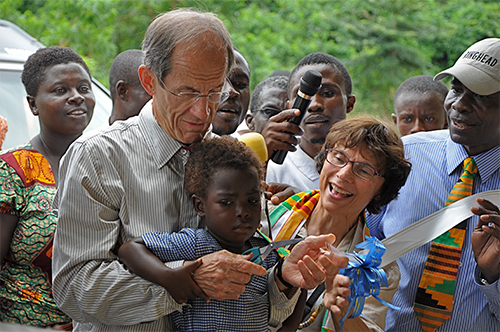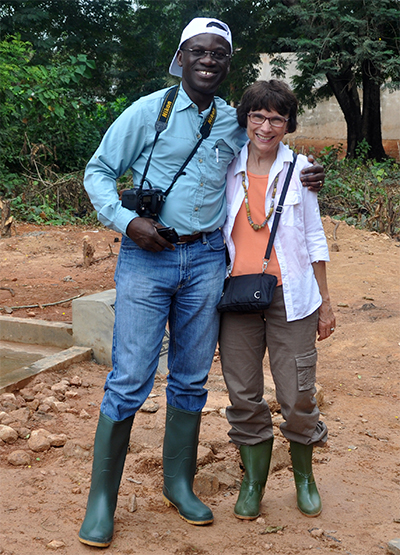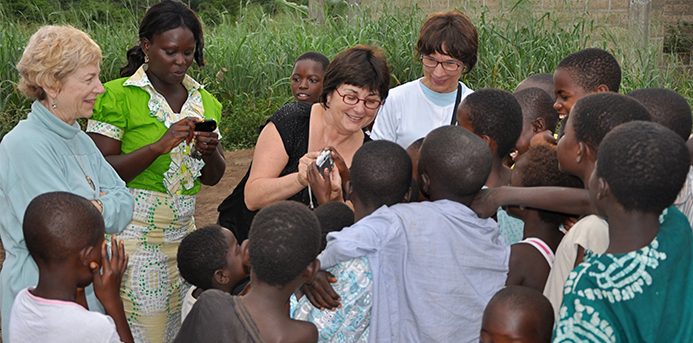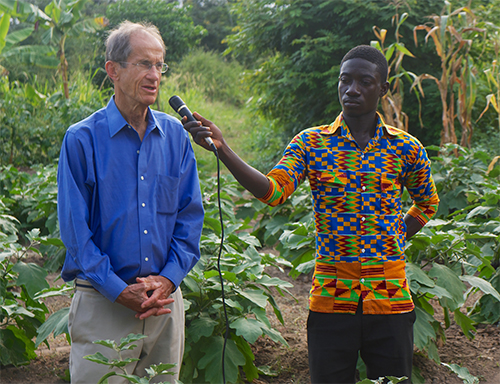Dick and Susie Kiphart felt a strong conviction to pay forward their abundant blessings through philanthropy. Because Dick was a partner at William Blair and one of Chicago’s most successful investment bankers and tech investors, their philanthropy was prodigious. It included Lyric Opera of Chicago, Ann & Robert H. Lurie Children’s Hospital of Chicago, Columbia College, programs putting arts in Chicago Public Schools and Bono’s DATA.
But it was the Kipharts relatively small gift of funding for one well in a remote village in Ghana that ultimately proved most transformational — for the Kipharts, as well as the world. That gift blossomed, led the Kipharts to Drs. Sola and Fumni Olopade and the University of Chicago’s Center For Global Health, and transformed the couple into social entrepreneurs too.
“For only $4,500, we built a well that forever transforms an entire village,” Susie gushed as she described the experience in 2006 for my very first Make It Better column. The well not only provided clean water, better hygiene, and safer food and drink for residents, but it also allowed the girls in the village to attend school each day instead of walking many miles carrying disease-ridden, dirty water from the nearest stream.

The couple so loved the impact of this gift that they wanted to do more. They encouraged friends and members of their church, Kenilworth Union, to give too. They visited Ghana and brought home photos of the wells. Soon, 15 more wells and a new school had been built.
Not long thereafter, though, a problem developed. No one would take care of the wells. “In Ghana, when something is received as a gift, people expect it to be maintained by the giver too.” Susie explains. “We hadn’t anticipated this.”
Fortunately, Dick’s William Blair partner, Ned Janotta, then introduced the Kipharts to the Olopades, Nigerians who earned their medical degrees in that country, but came to the U.S. as brilliant researchers too. They are also directors of the University of Chicago Center For Global Health (CGH), which is “an interdisciplinary program dedicated to improving health and well-being through education, research and training, and service in partnership with communities in the United States and around the world.” Basically this means CGH sends small teams of U of C experts from diverse academic areas to work in close partnership with local communities to study problems, find and implement smart, simple solutions, and advocate for strategic policy changes.
Sola explains, “Since my wife and I came to the United States for post doctorate work long ago, we have always gone back to Nigeria to share what we learned, give back to the country we love, and help them develop their own capacity.” Their work in Nigeria was so effective that U. of C. recruited Sola to CGH from the University of Illinois seven years ago to join Funmi, who had been there more than 20 years as a Distinguished Service Professor. She recently earned the FDR Freedom Award too.
The Olopades immediately identified the source of the problem once Dick explained it to them. They responded by embedding a social sciences graduate student for a summer in Ashante — one of the rural communities of interest to the Kiphart’s. Sola says, “It became clear from interviews with the community leaders that if you give a gift, they think it’s wrong to use that gift to generate funds even if it will be spent on maintenance. This includes not spending money to repair. They just call the NGO back to ask for assistance with repairs.”
The proposed solution had to empower the leadership and local residents to feel a responsibility to work on maintaining the well.
“So a committee was formed in each community. It always included at least one woman and seed funding of about $100. Our money supplemented whatever amount they levied themselves for the price of a bucket of water,” Sola explains. “Then we provided replacement materials and trained someone in the community to fix the pump and wells. This means they had money in hand and someone to fix it.”
The communities also were linked with the local government’s water corporation to provide ongoing support for maintenance of the boreholes.
Voila! Now villages felt responsible and empowered. Metaphorically speaking, CGH helped the Kipharts teach villages to fish, rather than just give them fish. They evolved from philanthropists into social entrepreneurs who created greater impact and opportunity with every dollar spent.
Susie clarifies, “Yes, we were schooled by the Olopades for sure, but we weren’t idiots. The whole thing is more nuanced than that. We started out with heart and we learned each time. We just learned a lot more when we were with them. Our learning curve was infinitely better.”
The Kipharts quickly realized all donated dollars could be far more impactful if they and other donors they solicited worked more closely with CGH. The Olopades eventually traveled with the Kipharts and others to Ghana. Their CGH teams recommended and helped to implement a plethora of strategies – using GPS to locate and identify all wells, aligning them with the country’s national water system so that work isn’t duplicated, and advocating for simple policy reforms through the Family Support Lifeline, a Kumasi-based non-governmental organization.
The bond continued to strengthen and grow. More projects and trips were undertaken to Ghana and Nigeria, eventually leading to more wells and schools built, improved care for new mothers and babies at maternity centers, plans for connecting farmers through cell phones to the world agricultural commodities market, dramatic decreases in respiratory illnesses by replacing the traditional wood burning stoves used for cooking in small shacks with cleaning burning ethanol stoves, and getting the United Nations Foundation and Shell Exploration to fund the initial ethanol stove intervention project in Nigeria while exploring local ethanol production within Nigeria – thereby creating more employment and an improved economy.

Arnie and Carol Kanter of Evanston attest to the powerful synergies created by the Kiphart/Olopade and CGH partnership. The couple are longtime friends of the Kipharts, having donated to and traveled to Ghana with the Kipharts five times since 2011. Arnie says, “The work that Dick and Susie did started with a single well. The story that I think is interesting is how that single well and the CGH partnership sprouted into 100 wells and how those wells sprouted school projects, medical clinics, and more. All of that led to the Kipharts leading a multi-million dollar funding of the global health program at the University of Chicago for more than 20 international projects around the world too.
“It is also a story of multiple generations. The son of Dick and Susie’s principal contact in Ghana is now spearheading the efforts there … Of course, this is important because no one generation is going to solve these problems.
“So, the story I like is an analog to the agricultural focus of Dick and Susie’s work, how a single seed spawns such wonderful and diverse work, through generations and around the world.”
The Olopades feel the power of that seed and their partnership too. “This has been a transformative seven years for me and CGH,” Sola says. “It has the potential to change things everywhere too!”
Sadly, this story has a sad pause. Dick Kiphart passed away this past September. Sola spoke eloquently at his service, which you can watch here:
“Dick was passionate about people everywhere he went,” Susie says. “He was very curious and interested in a lot of things, especially jobs, clean water, health, agriculture and education. For him it was all about the value of each human life. He was a Justice Junkie.”
Fortunately, Susie is a Justice Junkie too. The legacy will continue and grow. The world needs many, many more Justice Junkies and social entrepreneurs like the Kipharts, with partners like the Olopades and CGH.


